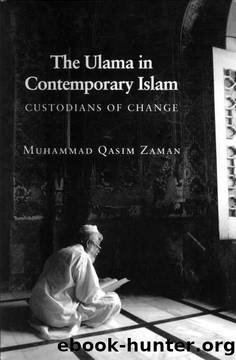The Ulama in Contemporary Islam: Custodians of Change (Princeton Studies in Muslim Politics) by Muhammad Qasim Zaman

Author:Muhammad Qasim Zaman [Zaman, Muhammad Qasim]
Language: eng
Format: epub
Published: 2010-05-22T11:31:00+00:00
HERE IS NO parallel in the Sunni Muslim world to the authority the highest-ranking Shi`i religious scholars have wielded since the emergence of the position of the marja` al-taqlid in the second half of the nineteenth century, a position which, in turn, became the basis for Khumayni's reformulation of the doctrine of wilayat al-fagih in 1970 and for the rise to power of the Shi`i religious establishment with the Iranian revolution of 1979. Insofar as the actual assumption of political power by the `ulama is concerned, perhaps the closest contemporary parallel to the Shi`i `ulama of Iran was represented by the strongly anti-Shi`a Sunni Taliban of Afghanistan. But in several other Muslim societies, too, the `ullama have come to play new and highly significant religiopolitical roles. 'This chapter examines the context in which these roles have emerged in a number of contemporary societies, both where Muslims comprise a numerical majority and where they are a minority. While comparative perspectives have frequently informed our discussion of the Pakistani `ulama in the previous chapters, the discussion here foregrounds the comparative dimension in order to understand what underlies the `ulama's contemporary activism. Why have the `ulama's activist roles emerged when they have, in particular since the last quarter of the twentieth century? How do the `ulama relate to the Islamists in their societies? And what do facets of this religiopolitical activism have in common across Muslim societies? These are among the questions I focus on in the following.
The `Ulama and the State in Egypt
The Egyptian ruling elite, like those in other Muslim societies, have long depended on the `ulama for religious legitimacy. But, as elsewhere, they have often also made efforts to restrict the power of the `ulama-an effort that, in modern times, has typically taken the form of "reforming" and regulating the `ulama's educational institutions. In examining the debate on madrasa reform in British India and Pakistan, we have seen how it provided the context in which new conceptions of religion began to emerge; these conceptions are, in turn, closely related to the `ulama's view of themselves as religious specialists in a modern society and polity. Governmental initiatives towards reform manifested differently in different Muslim societies, and they varied not only in their thoroughness but also in their effects. As the case of Egypt and the reform of the Azhar-argu- ably the most prestigious center of learning in the Sunni Muslim worldillustrates, those effects sometimes diverged from anything the government policy makers could have anticipated.
The most thoroughgoing reform of the Azhar, effected under President Nasser in 1961, was intended to integrate the `ulema, once and for all, into the educational mainstream.' Nasser was remarkably successful in this goal, at least in the short term. The Azhar was placed under the supervision of the Ministry of Endowments to facilitate its more effective regulation, and the regulation of religious life through it. At the same time, a new kind of Azhar graduate was envisaged, one who would be at home in both religious learning and the modern secular sciences.
Download
This site does not store any files on its server. We only index and link to content provided by other sites. Please contact the content providers to delete copyright contents if any and email us, we'll remove relevant links or contents immediately.
| Anthropology | Archaeology |
| Philosophy | Politics & Government |
| Social Sciences | Sociology |
| Women's Studies |
Cecilia; Or, Memoirs of an Heiress — Volume 1 by Fanny Burney(31333)
Cecilia; Or, Memoirs of an Heiress — Volume 3 by Fanny Burney(30934)
Cecilia; Or, Memoirs of an Heiress — Volume 2 by Fanny Burney(30889)
The Great Music City by Andrea Baker(21313)
We're Going to Need More Wine by Gabrielle Union(18073)
Bombshells: Glamour Girls of a Lifetime by Sullivan Steve(13108)
Pimp by Iceberg Slim(12931)
All the Missing Girls by Megan Miranda(12748)
Fifty Shades Freed by E L James(12451)
Norse Mythology by Gaiman Neil(11883)
Talking to Strangers by Malcolm Gladwell(11878)
Crazy Rich Asians by Kevin Kwan(8349)
Mindhunter: Inside the FBI's Elite Serial Crime Unit by John E. Douglas & Mark Olshaker(7834)
The Lost Art of Listening by Michael P. Nichols(6474)
Enlightenment Now: The Case for Reason, Science, Humanism, and Progress by Steven Pinker(6405)
Bad Blood by John Carreyrou(5769)
The Four Agreements by Don Miguel Ruiz(5511)
Weapons of Math Destruction by Cathy O'Neil(5037)
We Need to Talk by Celeste Headlee(4869)
